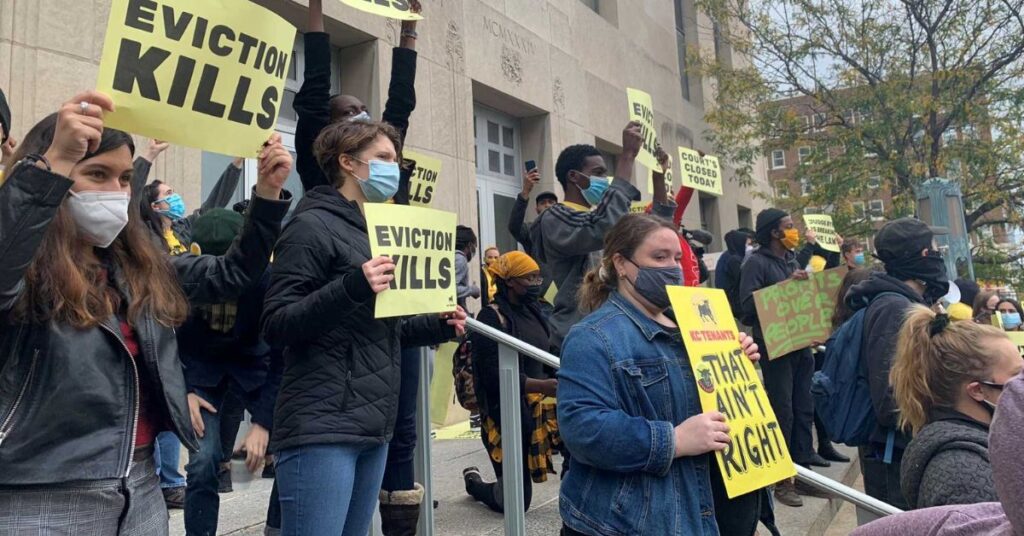Looking to bid farewell to a troublesome neighbor. Yearning for peace in your abode. “How Can I Get My Neighbor Evicted: A Step-by-Step Guide” is your roadmap to reclaiming your sanctuary. In this comprehensive guide, we’ll navigate through the intricate process of evicting a disruptive neighbor with clarity and precision.
From understanding your legal rights to initiating the eviction process, each step is outlined in simple, actionable terms. Say goodbye to noisy neighbors and hello to tranquility as we embark on this journey together.
Step 1: Reviewing documents and then serving the tenant with Notice
Following a thorough review of the documents, landlords proceed to serve the tenant with the appropriate notice, which depends on the circumstances of the eviction. For instance, if the eviction is due to the end of a fixed-term lease, a Section 21 Notice may be utilized in the UK, or a Notice to Vacate in the US.
If the eviction is based on specific breaches of the tenancy agreement, such as non-payment of rent or property damage, a Section 8 Notice in the UK or a Notice to Quit in the US may be required. It’s crucial to ensure that the notice is drafted accurately, contains all necessary information, and adheres to legal guidelines to avoid potential complications during the eviction process.
Step 2: Issue proceedings
After serving the tenant with the necessary notice, the next step involves initiating legal proceedings if the tenant fails to comply within the specified timeframe. This typically entails filing a case in the appropriate court or tribunal to obtain a possession order.
Landlords must follow the prescribed legal procedures and provide evidence supporting their grounds for eviction. Depending on the jurisdiction and the nature of the case, the tenant may have the opportunity to respond to the allegations before a judge makes a final decision. It’s essential to navigate this stage meticulously to ensure a fair and lawful resolution to the eviction process.
Step 3: Attend the court hearing (unless it is an accelerated Section 21)
Step 3 entails attending the court hearing unless the eviction process falls under an accelerated Section 21 procedure. During the hearing, both the landlord and tenant have the opportunity to present their arguments and evidence before a judge.
If the case proceeds to trial, the judge will carefully consider the facts and legal arguments presented by both parties before making a decision. Landlords must be well-prepared for the hearing, ensuring they have all necessary documentation and legal representation if required. While court proceedings can be daunting, they provide an opportunity for a fair and impartial resolution to the eviction dispute.
Step 4: Enter the property/obtain a Warrant of Possession
Step 4 involves entering the property or obtaining a Warrant of Possession. If the tenant has voluntarily vacated and returned the keys, the landlord can proceed to enter the property and take possession. However, if the tenant has not vacated and returned the keys, the landlord must apply to the court for a Warrant of Possession.
This legal document authorizes a bailiff to remove the tenant from the property. It’s essential to follow legal procedures carefully to avoid any complications or potential liabilities. Once the tenant has vacated, the landlord can change the locks and regain control of the property, ensuring compliance with the law throughout the process.
Future changes to Section 21 Notices
The proposed Renters Reform Bill represents a significant overhaul in eviction procedures, with a particular focus on Section 21 Notices. These notices, which currently allow landlords to evict tenants without providing a specific reason, are set to undergo substantial changes under the new legislation.
One of the key provisions of the Renters Reform Bill is the prohibition of no-fault evictions enabled by Section 21 Notices. This means that landlords will no longer be able to evict tenants without a valid reason, thereby ensuring greater stability and protection for renters.
Furthermore, the Renters Reform Bill seeks to strengthen the grounds for eviction, ensuring that landlords can only terminate tenancies for legitimate reasons. This move aims to curb instances of retaliatory evictions and provide tenants with greater security in their housing arrangements. By bolstering the criteria for eviction, the legislation aims to strike a balance between protecting the rights of tenants and addressing the legitimate concerns of landlords.
What is an Eviction?

An eviction refers to the legal process through which a landlord removes a tenant from a rental property. It typically occurs when the tenant breaches the terms of the lease agreement, such as failing to pay rent, causing property damage, or engaging in illegal activities on the premises. Evictions are governed by specific laws and regulations that vary depending on the jurisdiction.
The eviction process usually begins with the landlord serving the tenant with a formal notice, informing them of the lease violation, and providing a specified period to remedy the situation. If the tenant fails to comply with the notice, the landlord may file an eviction lawsuit in court. A judge will then review the case, and if the landlord proves the grounds for eviction, a court order may be issued to remove the tenant from the property.
Overall, an eviction is a legal remedy available to landlords to regain possession of their property when tenants fail to uphold their obligations under the lease agreement. It is a structured process designed to protect the rights of both landlords and tenants while ensuring that disputes are resolved fairly and according to the law.
When Can I Legally Evict a Tenant?
| Reason for Eviction | Explanation |
| Non-payment of Rent | Occurs when the tenant consistently fails to pay rent on time or in full. Landlords must provide written notice and allow a grace period for payment before pursuing eviction. |
| Violation of Lease Terms | Arises when tenants breach lease agreements by engaging in prohibited activities, causing property damage, or subletting without permission. Legal procedures must be followed for eviction. |
| End of Lease Term | Applicable when the lease agreement reaches its expiration date and the tenant refuses to vacate the premises. Landlords must provide advance notice and comply with local laws. |
| Other Legal Grounds | Includes reasons such as nuisance behavior, unauthorized occupants, or failure to maintain the property, depending on state and local laws. Landlords should follow applicable legal procedures. |
What are the Grounds for Eviction?
Non-payment of Rent: When tenants fail to pay rent as per the lease agreement.
Violation of Lease Terms: Breach of lease terms, such as damaging property or conducting illegal activities.
End of Lease Term: Tenant refuses to vacate after the lease agreement expires.
Nuisance Behavior: Tenants cause disturbances, inconvenience, or harm to neighbors or property.
Unauthorized Occupants: Additional individuals living in the property without landlord permission.
Property Damage: Tenants cause significant damage to the rental unit.
Illegal Activities: Using the rental property for illegal purposes, such as drug manufacturing.
Health or Safety Violations: Tenants create hazardous conditions or fail to maintain a safe environment.
Subletting Without Permission: Renting out the property to others without landlord’s consent.
Preparing for Eviction

- Review the lease agreement to understand your rights and obligations as a landlord regarding eviction.
- Document any lease violations or breaches by the tenant, such as non-payment of rent, property damage, or nuisance behavior.
- Serve the tenant with a written eviction notice that specifies the grounds for eviction and provides a reasonable timeline for compliance, as required by law.
- Seek legal advice or assistance to ensure that you follow the correct legal procedures and avoid potential legal pitfalls during the eviction process.
- Prepare necessary documentation and evidence to support your case if court proceedings become necessary.
- Consider offering the tenant assistance in finding alternative accommodation to facilitate a smoother transition.
- Stay updated on local eviction laws and regulations to ensure compliance throughout the eviction process.
Step 1: Giving Notice
Giving notice is the crucial first step in the eviction process. It begins with a thorough review of the lease agreement to pinpoint any breaches or violations by the tenant that justify eviction. Once identified, a written notice is prepared, clearly outlining the reasons for eviction and detailing the corrective actions required, such as paying overdue rent or remedying lease violations.
This notice must be served to the tenant following state and local laws, ensuring it includes essential details like compliance deadlines and consequences for non-compliance. Keeping meticulous records of the notice delivery, including dates and methods, is essential. Seeking guidance from legal experts or landlord-tenant organizations ensures compliance with eviction laws specific to the jurisdiction while maintaining open communication with the tenant fosters the possibility of resolving issues amicably before resorting to legal action.
Other Eviction Notice Requirements
In addition to providing clear reasons for eviction and compliance deadlines, eviction notices must adhere to various legal requirements depending on the jurisdiction. These requirements often include specific formatting guidelines, such as font size and style, and the inclusion of certain language mandated by local laws.
Furthermore, the method of delivering the notice to the tenant must comply with legal standards, whether through personal delivery, certified mail, or posting on the rental property. Failure to meet these additional requirements can invalidate the eviction notice, leading to delays or complications in the eviction process. Therefore, landlords must familiarize themselves with the eviction laws applicable to their area and ensure strict adherence to all notice requirements to avoid potential legal challenges from tenants.
Serving the Eviction Notice
- Serving the eviction notice is a crucial step in the process.
- The notice officially informs the tenant of the landlord’s intention to regain possession of the property.
- Depending on the jurisdiction, the notice may need to be delivered in person, sent via certified mail, or posted prominently on the rental property.
- It’s essential to follow the specific legal requirements outlined in local eviction laws to ensure the notice is valid.
- Landlords should keep detailed records of how and when the notice was served to demonstrate compliance with legal procedures.
- Serving the eviction notice effectively initiates the eviction process.
- It sets the stage for further legal actions if the tenant fails to comply with the terms outlined in the notice.
Step 2: Filing the Lawsuit
Filing the lawsuit marks the formal initiation of legal proceedings to evict the tenant. This step involves submitting the necessary paperwork to the appropriate court in the jurisdiction where the property is located. The landlord or their legal representative must prepare the required documents, which typically include a summons and complaint outlining the reasons for eviction.
Once filed, the court will review the documents and assign a case number. The landlord must pay any associated filing fees at this stage. It’s crucial to ensure all paperwork is completed accurately and in compliance with local eviction laws to avoid delays or dismissal of the case.
After filing the lawsuit, the court will serve the tenant with a copy of the summons and complaint, officially notifying them of the legal action against them. The tenant will then have a specified period to respond to the lawsuit, typically within a set number of days. If the tenant fails to respond within the designated timeframe, the court may issue a default judgment in favor of the landlord.
Know the Defenses to Eviction
Tenants facing eviction have legal rights and may have valid defenses to challenge the eviction proceedings. Understanding these defenses is crucial for both landlords and tenants involved in the eviction process.
Breach of Lease Agreement
If the landlord fails to fulfill their obligations under the lease agreement, such as by neglecting to maintain the property or provide essential services, the tenant may use this breach as a defense against eviction.
Improper Notice
If the eviction notice served by the landlord does not comply with legal requirements, such as insufficient notice period or improper service, the tenant may challenge the eviction on the grounds of improper notice.
Retaliation
If the landlord initiates eviction proceedings in retaliation for the tenant exercising their legal rights, such as reporting code violations or joining a tenant union, the tenant may claim retaliation as a defense.
Constructive Eviction
If the landlord’s actions or failure to act render the premises uninhabitable or significantly interfere with the tenant’s use and enjoyment of the property, the tenant may argue constructive eviction as a defense.
Discrimination
Eviction based on discriminatory reasons, such as race, religion, gender, or disability, is illegal. If the tenant believes they are being evicted due to discrimination, they may raise this as a defense.
Waiver or Estoppel
If the landlord has previously waived their right to enforce a particular lease provision or has led the tenant to believe they would not enforce it, the tenant may claim waiver or estoppel as a defense.
Payment of Rent
In cases where the eviction is due to non-payment of rent, the tenant may assert that they have paid the rent owed or that the landlord accepted partial payment, thus waiving their right to evict for non-payment.Top of Form
Speak with an Eviction Attorney Today
If you’re facing eviction or considering evicting a tenant, it’s essential to seek legal advice from an experienced eviction attorney. Eviction laws can be complex and vary from state to state, so having expert guidance is invaluable.
An eviction attorney can help you understand your rights and responsibilities under the law, assess the strength of your case, and represent you in court if necessary. Whether you’re a landlord seeking to remove a non-compliant tenant or a tenant facing wrongful eviction, an attorney specializing in eviction law can provide the legal expertise and support you need.
By consulting with an eviction attorney, you can ensure that your interests are protected throughout the eviction process and increase the likelihood of a favorable outcome. Don’t navigate the complexities of eviction law alone—speak with an eviction attorney today to get the guidance and representation you need.
Read As: Can a Tenant Put Up a Pool? – Rental Awareness
Frequently asked questions
Can I evict my neighbor on my own?
No, eviction requires following legal procedures, and attempting to evict someone without following the law can lead to legal consequences.
What steps should I take before considering eviction?
Try to resolve conflicts with your neighbor through communication or mediation. Eviction should be a last resort after all other options have been exhausted.
What are the valid reasons for evicting a neighbor?
Valid reasons may include non-payment of rent, violation of lease terms, disturbance to other residents, or illegal activities on the property.
How do I start the eviction process?
Begin by reviewing your lease agreement and local eviction laws. Then, provide written notice to your neighbor outlining the reasons for eviction and any steps they can take to remedy the situation.
What if my neighbor refuses to leave after receiving notice?
If your neighbor refuses to vacate the premises after receiving notice, you may need to file an eviction lawsuit in court.
Do I need an attorney for the eviction process?
While you can represent yourself in an eviction case, it’s advisable to seek legal counsel to ensure compliance with all legal requirements and maximize your chances of success.
How long does the eviction process take?
The duration of the eviction process varies depending on factors such as local laws, court backlog, and tenant defenses. It can take anywhere from a few weeks to several months.
What happens if I win the eviction case?
If you win the eviction case, your neighbor will be legally required to vacate the premises. The court may issue a writ of possession authorizing law enforcement to remove them if necessary.
Conclusion
In conclusion, the process of evicting a neighbor should always be approached with careful consideration and as a last resort. It involves navigating complex legal procedures and can potentially strain neighborly relations. Before initiating eviction proceedings, attempts should be made to resolve conflicts through communication, mediation, or alternative dispute resolution methods.
However, if eviction becomes necessary due to serious breaches of lease agreements or disruptive behavior, it’s essential to follow all legal requirements diligently. Seeking guidance from legal professionals and understanding local eviction laws are crucial steps in ensuring a smooth and lawful eviction process. Ultimately, while eviction may be a challenging and sometimes necessary step, it should be undertaken with caution and empathy towards all parties involved.

James, with 5 years of business experience, brings expertise to our website. His profile reflects a commitment to excellence and innovation in his field.







